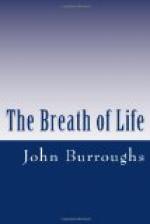Science cannot deal with fundamental questions. Only philosophy can do this. Science is only a tool or a key, and it can unlock only certain material problems. It cannot appraise itself. It is not a judge but a witness. Problems of mind, of character, moral, aesthetic, literary, artistic problems, are not its sphere. It counts and weighs and measures and analyzes, it traces relations, but it cannot appraise its own results. Science and religion come in conflict only when the latter seeks to deal with objective facts, and the former seeks to deal with subjective ideas and emotions. On the question of miracle they clash, because religion is then dealing with natural phenomena and challenges science. Philosophy offends science when it puts its own interpretation upon scientific facts. Science displeases literature when it dehumanizes nature and shows us irrefragable laws when we had looked for humanistic divinities.
XI
THE ARRIVAL OF THE FIT
In my youth I once heard the then well-known lecturer Starr King speak on “The Law of Disorder.” I have no recollection of the main thought of his discourse, but can see that it might have been upon the order and harmony that finally come out of the disharmonies of nature and of man. The whole universe goes blundering on, but surely arrives. Collisions and dispersions in the heavens above, and failure and destruction among living things on the earth below, yet here we all are in a world good to be in! The proof that it is good to be in is that we are actually here. It is as if the Creator played his right hand against his left—what one loses the other gains.
It has been aptly said that while Darwin’s theory of natural selection may account for the survival of the fittest, it does not account for the arrival of the fittest. The arrival of the fittest, sooner or later, seems in some way guaranteed by tendencies that are beyond the hit-and-miss method of natural selection.




